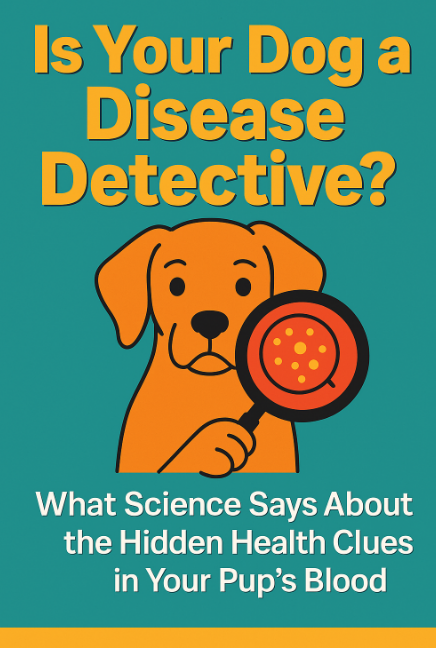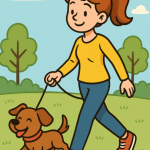
Is Your Dog a Disease Detective? What Science Says About the Hidden Health Clues in Your Pup’s Blood
Ever think your dog might be a superhero in disguise? 🦸♂️
Well, science just confirmed it: our furry friends might be saving lives—not just by being adorable—but by sniffing out serious diseases… literally.
A recent study out of Brazil found that dogs aren’t just man’s best friend—they’re frontline fighters in spotting two pretty nasty diseases: Chagas disease and visceral leishmaniasis (aka VL). Don’t worry, we’ll break down the science (minus the lab coat and big words). 🐾
Wait—What Are Chagas and Leishmaniasis (And Should I Be Freaking Out)?
If you’ve never heard of these, you’re not alone. Here’s the quick lowdown:
- Chagas disease is spread by “kissing bugs” (not nearly as romantic as they sound) and can lead to serious heart and digestive problems.
- Visceral leishmaniasis (VL) comes from tiny sand flies and can mess with your pet’s immune system big time.
Both are super serious and spread in parts of Latin America—including Brazil—where this new study was done. But here’s the kicker: dogs are often the first to catch these bugs… literally.
The Scoop from the Study
Scientists tested blood samples from 17 dogs living in Tremedal, a rural town in Brazil. What did they find?
- One pup tested positive for Chagas disease.
- One tested positive for VL.
- And (plot twist) it was the same dog.
Yup. One doggo was carrying both diseases, making him an accidental double agent in the fight against infections. 🕵️♀️🐶
But here’s where things get really interesting (and useful for you as a pet parent):
3 Things This Research Reveals That Every Pet Parent Should Know
1. Your Dog’s Health Might Be a Window Into Your Own
Dogs don’t just live with us—they live like us. That means they’re exposed to the same bugs, bites, and environmental risks. If your dog’s sick from a bug like T. cruzi or Leishmania… it could be a red flag for human risk, too. This makes them natural “canary in the coal mine” pets.
🦴 Real Talk Tip: If you live or travel in areas where Chagas or VL are a thing, ask your vet about testing—especially if your dog’s been acting off or has unexplained symptoms.
2. Not All Tests Are Created Equal
Here’s a wild stat: one test said 7 dogs had leishmaniasis. But a second, more accurate test showed only one actually did. That’s a 600% overestimation! 😱
📉 Translation: False positives are real, and they can lead to panic (and maybe unnecessary treatments). Always confirm results with your vet before jumping to conclusions.
3. Rural Dogs Are at Higher Risk—But That Doesn’t Mean Urban Pups Are Safe
The only dog with both diseases lived in a more rural part of town, where bugs are more active. But here’s the twist—urban dogs can still catch these diseases, especially if they roam, dig, or hang out in overgrown or unkempt areas.
🌿 Stay Safe Tip: Keep your yard clean, avoid letting your dog munch on mystery critters, and use vet-approved bug repellents if you’re in a risky area.
Why This Matters: One Health = All Health
This study is part of a bigger movement called One Health—the idea that our health is deeply connected with the animals and environment around us. And honestly? It makes sense. Our dogs live where we live. They breathe what we breathe. They roll in… well, everything. So paying attention to their health could help protect yours, too.
🐾 Big Picture: Monitoring dog health isn’t just about protecting pets—it’s a powerful tool for public health. Think of it as early warning radar for the whole community.
Share Your Pet’s Story! 🐕
Have you ever had a weird health mystery with your dog that turned out to be something more serious? What’s your go-to strategy for keeping your pup safe from bugs and bites?
Drop your stories, tips, or questions in the comments—we’d love to hear from you!
Ready to Be the Best Pet Parent Ever?
Want more science-backed pet health tips that are actually fun to read?
Subscribe to This Week in Pet Health—because your dog deserves more than just belly rubs (though those are important too).
🐶💌 Sign up now and get smarter about your pet’s health, one email at a time.
And hey, if you liked this post, share it with your fellow dog lovers! Your shares help us keep making science paws-itively awesome.




